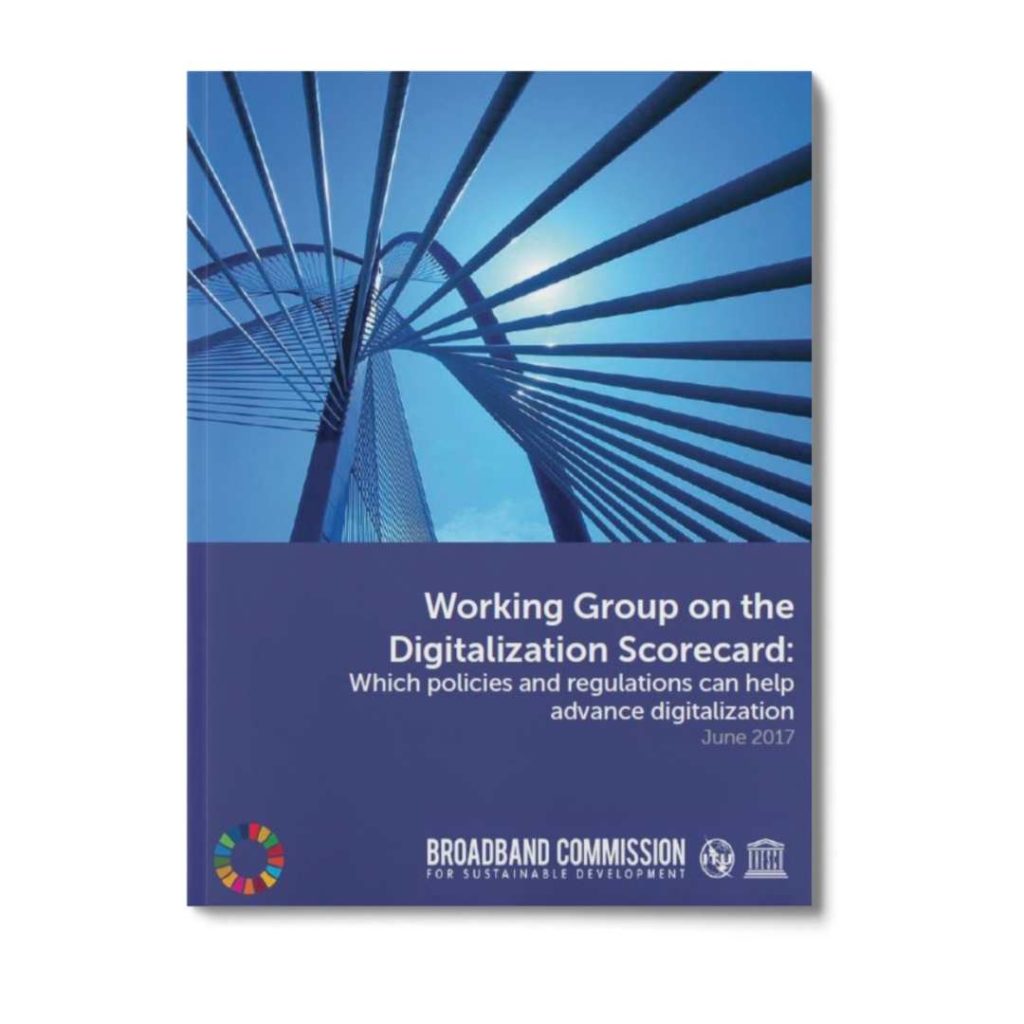How can policymakers and regulators breakdown barriers and introduce initiatives to accelerate digital change?
The Broadband Commission for Sustainable Development’s 2017 Working Group on the Digitalization Scorecard, chaired by Mr. Rajeev Suri, President and CEO of Nokia, was created with the aim to present the digitalization readiness of a country, complementary to existing ‘connectivity’ indexes; to examine vertical sectors’ digitalization readiness by analyzing sectors’ ‘incumbent’ policies and regulations; and to produce recommendations for how to improve vertical sectors’ policies and regulations to accelerate readiness.
Setting the Stage
What is Digitalization?
Digitalization is a phenomenon of integrating digital technologies and ICT solutions into businesses and society; it is a conversion from the analog world into one of digital communications in its multiple applications across the many domains of our society.
Policymakers all over the world are grappling with common questions around how to balance and guide the path to digitalization. From a global perspective, digitalization is scaling quickly in some countries, yet moving more slowly and unevenly in others. Some countries are successfully defining country visions premised on digital technology and knowledge-based economic advancement and translating these into reality through the development of national ICT transformation programs and policies, the rollout of infrastructure, the adoption of new digital services and creating the appropriate awareness of the use of these services amongst the populace.
In a world where the experience of digitalization is new and as yet untested in many fields, there is scope for all countries to observe what is happening to their peers and exemplars, implement good practices and learn from each other. An assessment of how well countries are developing policies, adopting the digital revolution and connecting the un-connected allows for the immediate identification of some of the best global examples to follow and best practices to adopt.
The Way Forward
Conclusions and Recommendations
The Working Group report, titled Which Policies and Regulations can Help Advance Digitalization, and Scorecard were discussed at the 2017 WSIS Forum session on Digitalization Scorecard: Advancing Digitalization of Verticals with Enabling Policies and Regulations. This session was built on the outcomes of the Working Group and focused on how policy interventions may advance the digitalization of sectors, such as education, agriculture, healthcare, transportation, and e-government.
The Digitalization Scorecard
The digitalization scorecard explores the differences in readiness from a policy and regulatory perspective. The scorecard presents a first assessment of policy and regulatory frameworks which encourage digitalization on an economy-wide basis. It takes into account relevant legislations, but also their implementation and more generally governmental interventions. The purpose of this study is to encourage a critical revision of the policy and regulatory frameworks, to map where regulations may create obstacles to the digitalization of a country’s priority sectors – or where necessary policies and regulations are missing.
The Scorecard covers five sectors:

Across six countries: Finland, Singapore, Colombia, Indonesia, Kenya, and Pakistan.
While every country covered in the scorecard showed a strong ambition in digitalization, a desire to succeed, and specific policy and regulatory initiatives, some countries were more advanced than others in taking important steps toward policies and regulations that enable digitalization, and more work still needs to be done in all six countries.

The larger strategic recommendations of this Working Group’s report are centered around the six themes detailed below:
- Establish digital leadership in the country through mandating a ministry, an agency or an inter-departmental collegial body to drive digitalization agenda in collaboration with other relevant departments
- Investigate how to encourage digital literacy and digital innovation through initiatives such as interactive training programs in community centers, and encourage the involvement of private organizations to accelerate digital literacy
- Establish an up-to-date cybersecurity strategy that includes incident response, mitigation measures and preventative controls for cyber-attack/crime.
- Establish national and/or sector-specific data protection laws that prohibit harmful uses of personal information that could erode trust in digital services
- Collaboratively with different stakeholders develop cloud policy framework that provides transparency and facilitation for:
- Data disclosures and supporting protocols
- Regulations associated with data rights
- Liability issues, especially for data misuse or loss.
- Encourage digital financial inclusion, including through-e-payment innovations facilitated by secure and reliable e-payment platforms and by adjusting current regulations that may hinder its development, such as requiring a high minimum level of capital investment
- Develop training and awareness building programs to educate farmers on available digital technologies and their potential benefits.
- Establish a mechanism to support (conduct and sponsor) R&D activities for e-agriculture innovation and services.
- Develop standardized frameworks
to provide transparency of real-time product supply and demand information to farmers online. - Introduce regulations to enhance food quality through the use of digital technologies (digital tracking, smart labeling).
- Create an education sector digitalization master plan, with supporting budget, for deploying e-learning as well as supporting training and awareness building initiatives.
Digitalize educational content from primary, secondary and tertiary curricula to increase education accessibility and affordability.
Support broadband connectivity for all educational institutions and community learning centres across the country.
Establish a clear responsibility to accredit digital delivery of education to protect students from fraud.
- Provide capacity-building activities/ support for public service personnel to build their capability and confidence to use digital technologies.
- Establish a function mandated and accountable for establishing e-government operations (including integration, coordination, implementation, monitoring and evaluation).
- Improve service delivery to citizens (G2C) for commonly provided government services (including Tax, Licensing, Immigration and Passports, ID, Social Security), and create policies/ regulations to facilitate:
- Acceptance protocols for e-signatures
- Creation of portals and online platforms that improves ease of access to government services
- Public education campaigns to promote G2C e-services
- e-payments (G2C and C2G), targeting the unbanked
- e-Government procedures/portals on the establishment of companies/ legal entities
- Procedures/portals for humanitarian crises management
- Information search portal
- Establish a policy framework for the development of e-procurement activities for the government.
- Upgrade government institutions’ access, site by site, to broadband connectivity to enhance the ability to deliver e-services and operate cloud services.
- Establish and implement an e-health master plan that includes an objective to design a comprehensive ICT education, training, and development program for registered healthcare practitioners (doctors, nurses) to increase their level of digital skill in adopting digital methods in the healthcare sector
- Design and deploy targeted education and awareness building for healthcare ecosystem players, such as community health workers and pharmacists, to utilize digital technologies.
- Establish a mechanism to encourage the development of new healthcare e-services, and localized (including language) content through:
- Clearly mandated responsibility to best positioned governmental entity
- Monetization of available healthcare
- e-services supported by the private sector or government entity
- Continuously update the policy and regulatory framework for healthcare
to allow for and encourage innovative e-health services and protocols, including new business models and seed-funding and/or public-private partnership arrangements to encourage health care digitalization initiatives in the public or private sector - Establish e-health data governance regulatory framework that covers privacy, security, interoperability for patient data stored electronically
- Enable government and its agencies to access national health data to conduct research into improving health outcomes across society, taking account of data privacy and anonymization requirements
- Prioritize the implementation of integrated, interoperable e-payment systems for transportation services (especially in cities).
- Improve citizens’ mobility through collecting, analyzing and making available transportation data to
users in real-time, with appropriate safeguards regarding data privacy and anonymization requirements. - Ensure that data collection and big data analytics are permitted (e.g., data from sensors, CCTVs, drones and other devices used to monitor traffic/movement, and data made available in a digital form to providers of transportation services (both public and private) to enable real-time traffic management for cities and other transportation authorities, with appropriate safeguards regarding data privacy and anonymization. requirements.
- Enable government and multilateral agencies to access transportation-related data to conduct research
into improving ways of commuting, taking account of data privacy and anonymization requirements.
- Digitalization – the conversion from the analog world into one of digital communications and its multiple applications across the many domains of our society – is the foundation for creating a connected world that makes us safer, healthier, smarter, and more productive.
The Working Group Model
Composition and Activities

Mr. Rajeev Suri
President and CEO, Nokia
- ITU
- Mr Leong Keng Thai, IMDA Singapore
- Dato Lee Yee Cheong, UNESCO ISTIC
- Ms. Anusha Rahman Khan, Minister of State for Information Technology and Telecommunication, Government of Pakistan
- Federal Office of Communications OFCOM, Switzerland
- GSMA
- European Commission
- Microsoft
- IADB
- Zain
- UN Women
- Korea Telecom
- Ericsson
- VEON
- Dr Speranza Ndege
- Inmarsat
- Baroness Beeban Kidron
- WIPO
- Bharti
- Intel
- Mr Henry Forero, MsNatasha Beschorner, The World Bank
- Mr Ken Lohento, Centre for Agricultural and Rural Cooperation (CTA), Netherlands
- Mr Cristhian Lizcano Ortiz, Consultor en Asuntos Jurídicos y Regulatorios Colombia
- Ailisto Heikki, Technical Research Centre of Finland
- Mr Jari Konttinen, Ms Salla Ahonen, Confederation of Finnish Industries (EK), Finland
- Mr Jani Lukander, Mr Virve Jokiranta, PwC Finland; Mr Julian Smith, Ms Kylie Collins, PwC Indonesia; Mr Charles Loh, Mr Zubin Daruwalla, PwC Singapore
- E. Minister Rudiantara Minister of Communication and Information Technology, Indonesia
- Ms Yudianto, SKM, M.Si, Ministry of Health, Indonesia
- Mr Ali Zaryab, Mr Syed Ahmad Mehdi, Telenor Pakistan
- Mr Snehal Patel, Singapore
The Working Group on the Digital Scorecard was announced in March 2016 at the Spring meeting of the Commission in Dubai. The group held an onsite meeting at the Broadband Commission Spring meeting 2017 held in Hong Kong SAR of China on 15th March and launched its final report in Finland on June 5th 2017.
Focus Area
Outcome Resources
Chair
Mr. Rajeev Suri
President and CEO of Nokia
Broadband Advocacy Targets
SDGs







